Warren Ellis Shoots Back In New 007 Comic
Sep 09, 2015

Dynamite Entertainment unveils fan-favorite author Warren Ellis as the writer for the new James Bond comic book series, with interior artwork rendered by Jason Masters (Batman Incorporated, Guardians of the Galaxy). The first six-issue story arc (SEP151205) in the James Bond 007 comic book series is entitled "VARGR." James Bond returns to London after a mission of vengeance in Helsinki, to take up the workload of a fallen 00 agent... but something evil is moving through the back streets of the city, and sinister plans are being laid for Bond in Berlin.
Check out the interview below by Cliff Biggers of Comic Shop News to hear Warren's thoughts on this ongoing series, which is the first to appear in over two decades.
James Bond #1 (SEP151205) is in comic shops November 4.
**********
Cliff Biggers: What's your history with James Bond? Did you read the original novels in your youth, or did you come to them later on? Did you continue with any of the authorized Bond novels by Amis, Gardner, etc.?
Warren Ellis: I may have read one or two in my teens, but I know I read most of them in my 30s -- the Flemings. I've never read the authorised novels, but I do have a very old copy of Amis' JAMES BOND DOSSIER.
Cliff Biggers: What's the definitive Bond, as you see it--that is, which book typifies the quintessential Bond for you?
Warren Ellis: Mid-to-late period Fleming. I don't know that I would pick out a specific book, not least because Bond the man clearly becomes a work in progress after Casino Royale.
Cliff Biggers: The later Bond books portray a more broken, disturbed character who seemed conflicted by the world in which he operated. Will we see any of that in your series?
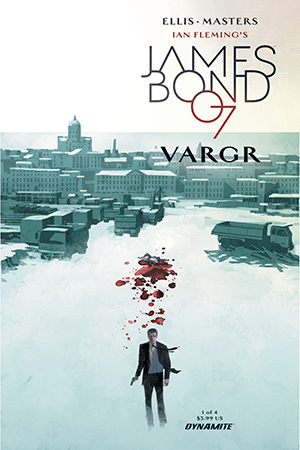 Warren Ellis: That, as you might gather from above, is pretty much where I'm going. That is by far the most interesting Bond, for me -- the man whose job is killing him.
Warren Ellis: That, as you might gather from above, is pretty much where I'm going. That is by far the most interesting Bond, for me -- the man whose job is killing him.
Cliff Biggers: The Bond novels were also less gadget-oriented, less focused on spectacle, and often very dark. Are you drawing from the novels for the inspiration for your series?
Warren Ellis: This commission is via the Ian Fleming Estate, to specifically write the Bond of the novels. This is, by design, not the cinematic Bond. So, yes. Not that I could resist doing a Bond cold-open: but it's a duel using construction materials in a building site in Helsinki in the middle of the night. So, yeah, you have it. There are, depending on your perspective, a couple of gadgets in there, but Bond doesn't have them. For part of VARGR, he doesn't even have his (updated) Walther.
Cliff Biggers: Bond, like Sherlock Holmes or Tarzan or Sexton Blake, is one of those heroes with dedicated fans who have a voluminous knowledge of the character's background, changing history, etc. Did you feel the need to put in some advance time for research to build a sort of road map of Bond's career? Have you worked out a master plan as to where your stories fit into the overall scheme of Bond's career? We know that several of the early novels all take place in the 1954-1955 period, for instance. Will you reference those familiar cases, simply changing the time period to something more recent? Rather than being born in 1919, 1921, or 1924 (all of which are years that Fleming seems to set as Bond's birth year in different books), will you update Bond to being born in 1975 or 1979? How does that change the character?
Warren Ellis: I am being inspecific enough to drive you nuts, Cliff. I have a sketch of his life in my head. The devoted reader of the novels may find one or two Easter eggs in VARGR, but I am carefully not referring back to other books -- I didn't want this thing to be inside the beltway, as it were. Someone with the simplest knowledge of Bond should be able to pick it up and not feel like I'm speaking over their head to a deeply involved group of Bond students.
If you needed to place it, then it would probably sit among the late-middle of the books: that more damaged and callous Bond.
Cliff Biggers: You're presenting Bond as a contemporary spy; how do you adapt the character from a hero who epitomized the post-WW2 / Cold War era that Ian Fleming wrote about? Fleming seemed to have built a meticulous (albeit occasionally contradictory) timeline for Bond that was largely built around the role of the British government as a major world power in the 1940s through the 1960s. How do you make that play against today's changing global politics?
 Warren Ellis: I'm using the age-45 frame, certainly, and my Bond probably has ten years left in 00. I'm carefully *not* revealing a meticulous new timeline for a contemporary Bond -- I have much of one in my head, but we will only see elements of it as and when they become necessary to telling my stories in a clear and direct way. And that hasn't been required yet.
Warren Ellis: I'm using the age-45 frame, certainly, and my Bond probably has ten years left in 00. I'm carefully *not* revealing a meticulous new timeline for a contemporary Bond -- I have much of one in my head, but we will only see elements of it as and when they become necessary to telling my stories in a clear and direct way. And that hasn't been required yet.
The nature of Bond's role in the world hasn't really changed. Fleming was certainly responding, in several ways, to the end of the British Empire -- sometimes in fantastical ways, sometimes, I think, in melancholy ways. Sometimes there was denial, sometimes acceptance. Which is entirely apt, because any secret intelligence service has to believe it serves a need. It was coming, in the 50s and 60s -- Britain as a smaller thing in a bigger world. I can pursue that while remaining realistic about Britain's lack of real importance on the world stage.
Cliff Biggers: What's the plot line of your first arc, VARGR? Where does the name come from? (I know the basic premise as described in the Dynamite press release, but I know that readers would like to know more about what he uncovers in Helsinki and Berlin--I feel like we know the premise, but not as much as readers would like to know about the plot.
Warren Ellis: Well, that's probably a function of where we are as an audience in 2015. Explaining the plot in an interview, for me, defeats the purpose of writing the book. The basic premise is all you need: Bond takes on a case left by a deceased fellow 00 agent, which leads him to consult in Berlin with the wealthy, brilliant medical inventor Slaven Kurjak in pursuit of an agile and high-tech drugs operation -- and then it all goes wrong.
And, for a Bond aficionado, this: Fleming didn't really deal with criminal narcotics in any sustained way -- I want to say RISICO (which I nearly called this story) was the only one that touched on it, and that was a short? I like to think that a Fleming working in a later period would have written in a significant way about drug crime.
Cliff Biggers: There has also been a contingency who have maintained that we are less disposed as a culture to accept the idea of a hero with a license to kill, because modern society is more questioning of the motives and methods of the government and its agents. Any thoughts on that?
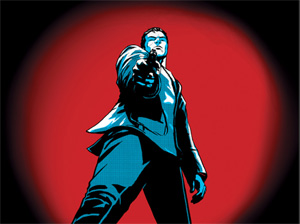 Warren Ellis: I don't disagree with that, but that doesn't make the stories less worth telling, because those motives and methods of government still exist. The trick is the same trick as writing any anti-hero -- make the other side even worse. I don't think it's necessarily wrong to conceive of Bond as, at best, a necessary villain. Yes, it's politically and ethically complex, and I'm strongly aware of that. It makes the job interesting.
Warren Ellis: I don't disagree with that, but that doesn't make the stories less worth telling, because those motives and methods of government still exist. The trick is the same trick as writing any anti-hero -- make the other side even worse. I don't think it's necessarily wrong to conceive of Bond as, at best, a necessary villain. Yes, it's politically and ethically complex, and I'm strongly aware of that. It makes the job interesting.
Cliff Biggers: Fleming took Bond all over the globe--will we see similar international intrigue in your Bond storylines? I know you mention Helsinki & Berlin for the first issue/arc--does his mission take him further afield than that?
Warren Ellis: To the Norwegian coast. I decided I wanted a cold story, for the first one -- and god knows winter in Berlin is brutal. Also, when Fleming was writing, the locales were difficult for ordinary people to reach, which added to their exoticism. These days, most of them can be reached by Easyjet or Ryanair from a regional airport. In VARGR, I can get the same exoticism from the atemporal strangeness of East Berlin, which still looks like a Communist district, and from places like remote Norwegian islands that are comparably difficult to reach. And Helsinki's in there because I just wanted somewhere Brutalist and miserable, which chunks of Helsinki certainly are. I couldn't bring myself to take Bond to Helsinki's black metal karaoke bar.
Cliff Biggers: Will Bond have allies from other intelligence agencies, or will he function largely as a loner?
Warren Ellis: In VARGR, he's functioning entirely within 6. As I note below, I may go a different way in a future story, but for this first book I wanted a very strict focus on Bond alone, and MI6 alone.
Cliff Biggers: What core members of Bond's supporting cast are you utilizing? Are you introducing any new recurring members in your run?
Warren Ellis: I'm retaining the necessary ones: M, Moneypenny, Bill Tanner and, of course, Major Boothroyd - not least because the real Boothroyd was such an eccentric. Right now -- and this could change, obviously -- I feel no need to introduce new recurring characters. I'd kind of like to use Felix Leiter at some stage -- there's a whole bunch of interesting stuff to unpack with that character.
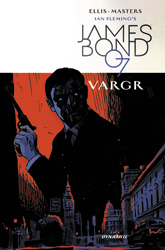 |
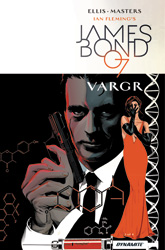 |
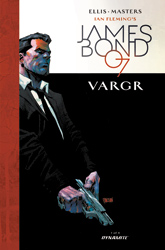 |
Cliff Biggers: Will organizations like Smersh and Spectre, who Fleming liked to use, play a role in the story as well?
Warren Ellis: Not in VARGR, and probably not in the next one. I decided to steer clear of them due to the upcoming film. Perhaps for the next one I may decide to give serious thought to contemporising those ideas, but I don't have to think about that for another couple of months. They're classic Bond constructs, of course, but need to be adapted to these days of asymmetrical warfare and franchised warfighting cells.
Cliff Biggers: Seen through a contemporary lens, Bond comes across as misogynistic at times (although it can be argued that he reflected some of the attitudes and mores of his era, although even there Bond was more amoral than the norm); how do you deal with that misogyny in a modern series? Is it an inherent part of Bond's nature, or are those who categorize Bond as misogynistic misreading what Fleming was portraying with the character?
Warren Ellis: A lot of this, of course, is about postwar British mores: many of them were still around when I was growing up in the Seventies. The attitude to people of colour, the notion that lesbians really just needed a good seeing-to to fix them... all depressingly familiar. Contemporising Bond, for me, requires the writer to move that baseline -- on a simple level, it was possible for the Bond of CASINO ROYALE to have grown up with those views inculcated into him, because Bond was conceived of as an "ordinary" man, but the Bond of VARGR could not have grown up like that.
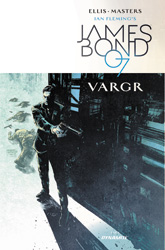 |
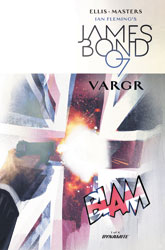 |
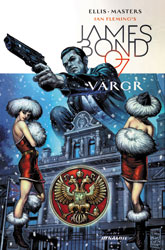 |
All that said: yes, I believe there to be a streak of misogyny in Bond, but I think a contemporary reading exposes much (but not all) of that as misanthropy. I suspect Bill Tanner is Bond's one single friend.
Cliff Biggers: How long are you on board for this series? How far ahead have you plotted?
Warren Ellis: Right now, I'm on board for a year. I'm in the middle of finishing up VARGR, which is the first six issues, and I'm far enough ahead that that buys me a couple of months to sit and think about what the next six issues are. After that, either I'll see if I have more to say or see whether or not everyone's sick of me.





